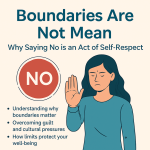Why Do We Fear Change? Understanding Resistance to Growth and How to Overcome It
“I want things to be different… but what if it all goes wrong?”
Change can be scary—even when we know it’s necessary. Whether it’s leaving an unhealthy relationship, changing careers, starting therapy, or setting boundaries, many of us stay stuck in familiar discomfort rather than risk the unknown.
But why do we do this to ourselves? And more importantly—how can we stop?
💡 Why Does Change Feel So Hard?
Your brain is wired to keep you safe—not happy. It prefers the familiar, even when the familiar is painful. Change brings uncertainty, and uncertainty feels unsafe, so your brain triggers anxiety, doubt, and hesitation.
We fear change because:
- It disrupts our comfort zone.
- It forces us to face the unknown.
- It can feel like a loss of control.
- We fear failing or making the wrong decision.
Even when staying stuck is uncomfortable, it can feel easier than the unknown.
🚦 Signs You Might Be Afraid of Change
Take a moment to reflect—do any of these sound familiar?
✔ You complain about your situation but struggle to take action.
✔ You say things like “I’ll wait until the timing is right” (but it never is).
✔ You overthink every option to the point of never deciding.
✔ You feel paralyzed by what-ifs and worst-case scenarios.
✔ You stay in toxic spaces—relationships, jobs, habits—because they’re familiar.
The first step to growth is admitting you’re afraid—not weak.
🔍 The Cost of Avoiding Change
We often talk about the risks of change, but rarely about the costs of staying stuck.
Avoiding change can lead to:
- Chronic stress and dissatisfaction
- Missed opportunities for happiness, connection, and growth
- Mental health struggles—like anxiety, depression, and burnout
- Feeling like life is just happening to you, not being lived intentionally
Every time you choose comfort over courage, you teach yourself to stay small.
💙 How to Embrace Change with Confidence
The goal isn’t to stop feeling afraid—it’s to move forward with the fear.
✔ Start small.
- Change doesn’t have to be a leap—it can be tiny, manageable steps.
- Ask yourself: What is one small action I can take today?
✔ Reframe failure.
- Mistakes are part of the process—not proof that you shouldn’t try.
- Ask: “What can I learn if this doesn’t go perfectly?”
✔ Anchor yourself in your ‘why’.
- It’s easier to move forward when you stay connected to why you want the change.
- Visualize the life you want to build.
✔ Talk to someone.
- Whether it’s a trusted friend, a mentor, or a therapist, having support helps you face uncertainty with more strength.
🚀 Final Thought: Staying Stuck Hurts Too
Change is uncomfortable—but so is staying the same when you know you’re meant for more.
✔ You can be scared and still take the first step.
✔ You are allowed to want more, even if you don’t have it all figured out.
✔ Growth requires discomfort—but it also creates freedom.
💙 If fear is keeping you stuck, therapy can help you unpack what’s holding you back and guide you toward meaningful change—one brave step at a time.




